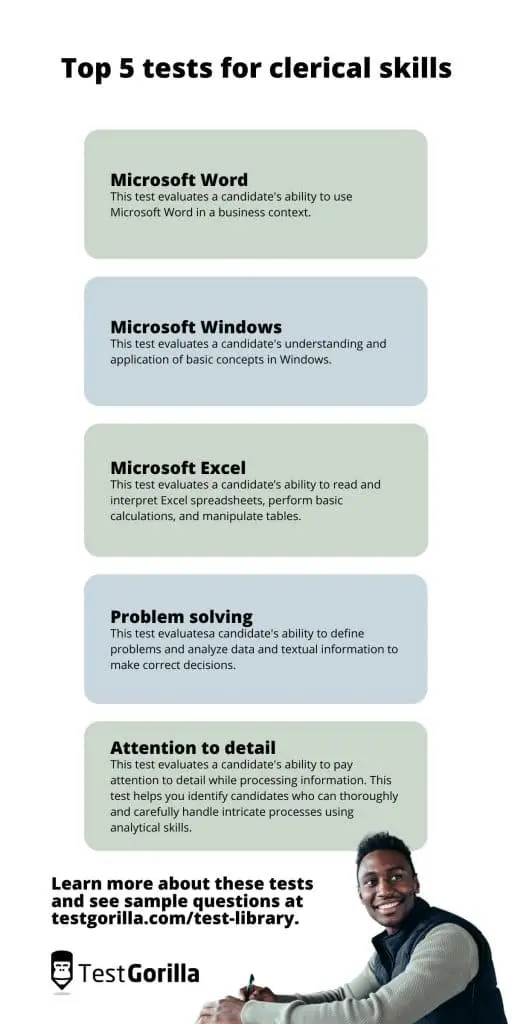Clerical skills are the everyday skills that all businesses need to run efficiently, ultimately adding value to the team’s operations. They are tasks like filing, answering the phone, and scheduling appointments that often go overlooked but are sorely missed when neglected. Hiring for clerical skills can be a challenge without an understanding of what sub-skills exist within the clerical skillset and how to hire for them.
This guide aims to cover that information to help you make the right hires when you need to find an employee with clerical skills.
Table of contents
Why are clerical skills so important?
Employees with exceptional clerical skills support a business at the most fundamental level and add value to its success, efficiency, and momentum as a company. Little mistakes at the clerical level (e.g., misplaced commas or lost documents) can lead to lost revenue or embarrassment for the company. That’s why it’s important not to undervalue clerical skills.
Should a new hire have many talents, but poor clerical skills, there can be substantial risks involved. For instance, they could report and record misinformation relating to financials or other important information. If this goes unnoticed, the consequences could cost the company and teams money, energy, and credibility. Even if a role doesn’t call for higher-level duties such as strategy or revolutionary ideation, clerical strengths are crucial to your company’s success.
Think about the teams that help keep the company afloat. Roles like project managers, team coordinators, executive assistants, and other key players and project stakeholders must have a deep commitment to time and team management and delivering key objectives with precision and ease. Even a small mistake in a client-facing report and or slide deck can lead to problems; clerically skilled professionals avoid those problems.
How to identify a candidate with strong clerical skills
Clerical skills can be developed through experience and time; however, some professionals focus their efforts and take various vocational or business classes to strengthen their skillset further. And some people are just naturals when it comes to clerical work.
The most common skills associated with clerical jobs are attention to detail, verbal and written communication, organization, and time management. The following will allow successful employees to multitask, adapt, and manage assignments with finesse and accuracy.
Check their resume
Most often, you’ll be introduced to a client by their resume. Among the titles and achievement metrics, it’s important not to overlook their soft skills or signals that they are incredible clerical skills.
Important skills for clerical jobs include communication, computer skills, numeracy, organization, and problem-solving. When taking a closer look at their experience and background, keep an eye out for responsibilities and professional successes that further developed their active listening, assessment, analysis, and documentation preparation skills.
It’s also important to look out for red flags. Recruiters should be cautious of gimmicks, overused phrases, and generic, even vague background descriptions. According to Fast Company, common tricks can include visual distractions, keyword overload, and a lack of earned metrics.
Check their LinkedIn profile
In addition to a resume, a candidate’s LinkedIn profile will surely be passed on during the interview process. It can be a make-or-break step and a shortcut for a recruiter deciding if this candidate should be greenlit to the next phase of the process.
When pursuing their LinkedIn profile, study their attention-to-detail with spelling, grammar, and tense. Having a typo or flub on your profile is indicative of a shortcoming with detail.
Next, take time to read their recommendations and endorsements — and read in between the lines. If a candidate has glowing reviews, but all of the notes mention how brilliant they are at strategy and ideation, not about their ability to problem-solve or execute, you should note that.
Finally, a LinkedIn profile is a great time to conduct a side-by-side comparison of their profile to their resume. This tactic allows a recruiter to see if there is consistency, common themes, and accuracy in their spelling and grammar.
Use assessments
An additional layer of certainty can be attained by administering assessments early in the hiring process. Assessments can guide your hiring decisions while reducing costs associated with employee turnover by increasing their overall satisfaction. Appraisals are also a great way to measure a candidate’s likelihood to succeed in your role of interest by comparing their results across different test types.
Though there are many types of assessments, the following are some of the most common: written assessments, aptitude tests, and paid trials.
Written assessments
As the category suggests, written tests can collect a candidate’s aptitude on the specific subject matter or can be an instrument to record how they would handle a situation. Written assessments such as tests that access a candidate’s leveling with language, grammar, mathematics, or catching mistakes can be fantastic options for a recruiter.
Trisha Bartle says, “Pre-employment assessments should have standardized questions for every applicant. When the test is written, provide the same sheet of questions to everyone who wants a job with your company.”
Aptitude tests
Next is the option to gauge a candidate’s clerical skills by hosting an aptitude test. One of the benefits of aptitude tests is comparing all exam entries against each other, alleviating the chance of emotions to curry favor with the recruiting team.
And as Bryq notes, there is not just one type of aptitude test, “Aptitude tests used in recruitment tend to focus more on one work-related task or ability. For example, a candidate’s aptitude for logical reasoning. As opposed to other kinds of tests (such as personality tests), each question in these has only one correct answer. The tests are timed. This time limit is intentionally short. That’s so that only 1-5% of people could ever complete it accurately in time.”
Some examples of aptitude tests include:
Numerical reasoning tests. Specifically designed to measure a candidate’s numerical aptitude and ability to interpret, analyze, and draw conclusions from sets of data.
Abstract reasoning tests. Designed to measure your lateral thinking and fluid intelligence to find the accuracy and speed in which you can identify and interpret the relationship between a collection of shapes and patterns.
Verbal reasoning tests. Designed to evaluate your understanding of language and level of oral comprehension and logic, as well as your talent when it comes to filtering out critical information from a bulk of the text.
TestGorilla has a number of aptitude tests specific to clerical work. These include:
Paid trials
A paid trial is a real world assignment that you give to promising candidates. Giving candidates an assignment that is similar to one they would have on the job is a great way to get a feel for how well they’ll be able to fill the role you’re hiring for. For tasks that would require the candidate to have access to confidential information, you’ll need to resort to a simulation using fake data instead. Once they complete the assignment, look through it for errors to see how detail-oriented each candidate is.
Check their references
So often, recruiters and hiring managers can drop the ball in the final stretch. Understandably, the team and the candidates’ pool have undergone a ringer of interviews, countless resumes, and time to perform the last phase before extending an offer letter: checking references.
Though some companies use reference checks to confirm employment dates, it can be an opportune time to speak with a candidate’s former manager or team members to have a first-hand account of their clerical skills.
For the most productive call or exchange of emails, ask questions about specific assignments or request that the connection give particular examples of the candidate “having attention-to-detail” or demonstrating success with clerical duties.
Find candidates you can trust
Hiring talent with exceptional clerical skills is no task or project to overlook or undermine. Finding employees to trust with finances, confidential information, and proprietary information is paramount for any business. By implementing the tips we’ve talked about in this article, you’ll be able to find someone with a high level of attention to detail so you can trust them with mission-critical tasks.
Related posts
Hire the best candidates with TestGorilla
Create pre-employment assessments in minutes to screen candidates, save time, and hire the best talent.
Latest posts
The best advice in pre-employment testing, in your inbox.
No spam. Unsubscribe at any time.

Hire the best. No bias. No stress.
Our screening tests identify the best candidates and make your hiring decisions faster, easier, and bias-free.
Free resources
This checklist covers key features you should look for when choosing a skills testing platform
This resource will help you develop an onboarding checklist for new hires.
How to assess your candidates' attention to detail.
Learn how to get human resources certified through HRCI or SHRM.
Learn how you can improve the level of talent at your company.
Learn how CapitalT reduced hiring bias with online skills assessments.
Learn how to make the resume process more efficient and more effective.
Improve your hiring strategy with these 7 critical recruitment metrics.
Learn how Sukhi decreased time spent reviewing resumes by 83%!
Hire more efficiently with these hacks that 99% of recruiters aren't using.
Make a business case for diversity and inclusion initiatives with this data.


















